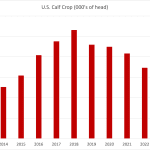Prairie canola crushers are pulling their belts even tighter than they
did during last year’s canola famine.
They expect lots of plant shutdowns as the drought-shriveled canola
crop flirts with pricing itself out of the market.
“Our plants are going to run very slow and there will be shutdowns,”
said Woody Galloway, CanAmera Foods’ manager of canola procurement.
“We got into pretty good rationing last year and this year it’s just
more of the same.”
Read Also

Canola used in only quarter of Canadian biofuel
Less than one-quarter of the biodiesel and renewable diesel used in Canada in 2024 was made from canola oil feedstock
Canadian canola crushers can handle four million tonnes of canola per
year, which is more than the entire 2002 prairie crop. Exporters also
want a share.
This tight supply means crushing plants will be underused and
unprofitable, said Canadian Oilseed Processors’ Association executive
director Robert Broeska.
“The companies want to see their enterprises return something above
their costs, but this is going to be a year that tests them hard,”
Broeska said. “But when you have fixed assets in the ground, you have
to look at the long run, just like farmers do.”
Canola crushers make money by selling canola oil and meal for more than
it costs to buy and process canola seed. Their problem in a year like
this is that they need to make a large profit margin on each tonne
crushed to make up for the small number of tonnes they crush.
Canola oil is already selling at a high premium to soybean oil, so
pushing that margin higher will be difficult.
Galloway said this year will show how much canola oil the world
absolutely needs. High prices will scare away discretionary demand.
Canadian crushers processed three million tonnes of canola seed in
2000-01. High canola prices cut that to 2.3 million tonnes in the
2001-02 crop year, which just ended.
Galloway said he expects this year’s crush to fall to 1.8 million
tonnes, which means a further rationing of 500,000 tonnes.
“There’s only so much demand for canola priced as high as we need to
make a margin,” Galloway said.
The crushers’ situation this fall has been eased by the steep run up in
canola prices last year. The prices scared off canola buyers, leaving a
larger than expected amount of canola still to be sold at the end of
the crop year.
“We were supposed to run out of canola and we ended up with a 1.2
million tonne carryover,” Galloway said. That pattern could continue
this year if prices spike too high.
Statcom Ltd. canola analyst Nolita Clyde said crushers will be cautious
about offering canola oil to buyers, and that will probably see them
crush even less seed than they could acquire.
“I don’t think any of them want to offer too much too far ahead,” she
said.
“They don’t want to overextend themselves.”
Broeska said he expects to see a lot of plant shutdowns after March,
when canola supplies become scarce and hard to guarantee.
Canola crushers have few options when they can’t find enough canola.
“Soft seed” plants such as those on the Prairies can handle canola,
sunflowers and flax, but they aren’t equipped to process soybeans, the
biggest oilseed crop.
Canola processors tend to heat and moisten canola seed, crush it,
extract the oil and cleanse it. Soybean plants need to de-hull, flake
and roll the beans, and then extract the oil.
Broeska said prairie processors could bring in new machinery to handle
soybeans, but that wouldn’t make much sense. There is no need to spend
money on soybean crushing equipment if companies expect next year to
see a normal canola crop, which has to be the assumption.
As well, it is expensive to ship soybeans from the United States to the
Prairies.
On the bright side, Broeska doesn’t expect to see the same instability
in the crushing industry that appeared last time canola supplies were
severely short.
“When the industry was less financially secure and owned by less stable
interests than own it now, (some owners) did throw in the towel,”
Broeska said.
Galloway said the market will decide how much of the scarce canola
supplies get crushed this year.
“The oil industry, the protein industry and the crushers are already in
this (rationing) mode,” Galloway said.
“This year we’ll just ratchet it down more.”

















